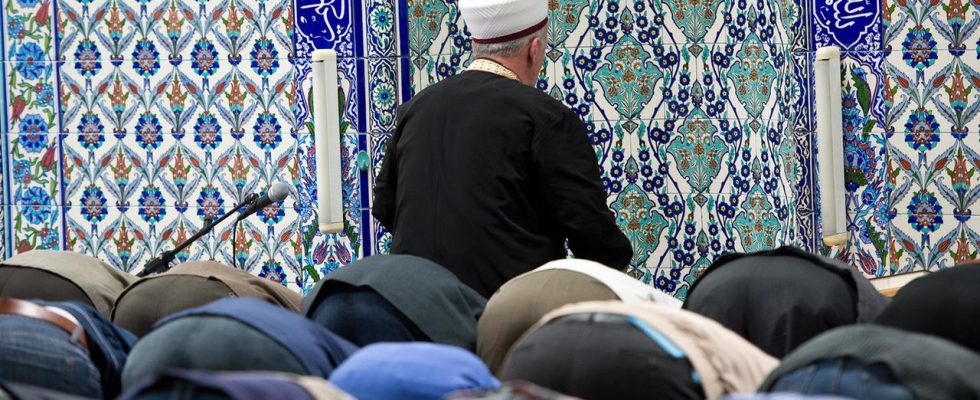background
Since the Hamas terrorist attack, there has been increased discussion about Muslim anti-Semitism. It also casts shadows on the local mosque communities and associations. However, these are not representative.
Almost a year ago, Interior Minister Nancy Faeser invited people to the first Islamic conference of this legislative period. She formulated her perspective in clear words: “I want to gradually reduce the state sending of imams from abroad to Germany with the aim of ending it.”
The SPD politician also explained the direction in which she intends to look: “The sending of imams to Germany is particularly an issue that affects Turkey.”
Anti-Semitic hate speech from the Ministry of Religion
In fact, most foreign prayer leaders in this country come from Turkey: According to the Federal Ministry of the Interior, the Turkish Office for Religious Affairs – Diyanet for short – is currently sending around 1,000 so-called religious employees to Germany. The vast majority of them work in congregations belonging to the DITIB mosque association. “In the mid or low double-digit range” but also in the Islamic Community Milli Görüs and the ATIB association, which, according to the Office for the Protection of the Constitution, is connected to the right-wing extremist “Gray Wolves”.
The chief employer of these approximately 1,000 imams is Ali Erbas. The 62-year-old president of Turkey’s Religious Affairs Office is a close loyalist of Recep Tayyip Erdogan. In addition, the Islamic theologian – similar to the Turkish president – likes to incite against Israel. In his first Friday sermon after the serious attack by the terrorist Hamas, he said: “Like a rusty dagger stuck in the heart of Muslim soil, Israel has resorted to all kinds of oppression against Muslims in the countries it occupies.”
German Islam Conference
The German Islam Conference is the central forum for dialogue between the state and Muslims. It has existed since 2006. The results so far have included the establishment of Islamic theology seminars at German universities, initiatives for the training of imams in Germany and increased cooperation with mosque communities.
Members of the Islam Conference include the Islamic associations that maintain the majority of mosques in Germany, as well as Muslims from science and civil society.
Delimitation from Ankara demanded
The DITIB in Germany did not condemn the anti-Semitism of its theological leader in Ankara. Her statement on Hamas’ terrorist attack was also hesitant, joining the half-hearted statements made by other Islamic associations. “I would have expected that there would be a clear positioning on terror,” emphasizes Lamya Kaddor, a member of the Bundestag for the Green Party and a member of the Liberal Islamic Association, to the SWR. It would have been desirable for them if the Islamic associations had called for peace prayers, joint demonstrations or vigils – directly after the Hamas attack.
Outbursts like those of the Diyanet president make it clear what is meant when there is currently talk of Muslim anti-Semitism. That’s why Eren Güvercin, journalist and member of the Muslim “Alhambra Society”, pleaded in Deutschlandfunk for an unmistakable one Handling with the DITIB. After all, the association runs by far the most mosques in Germany: “This Ali Erbas is the religious authority of the German DITIB. And my demand to German politicians is to confront the DITIB to distance themselves from this anti-Semitic agitation of their religious authority in Ankara distance.”
Mosque associations not representative
Kaddor also points out that the Islamic associations, which politicians often see as contacts and indicators of Muslim life in Germany, only represent a small part of the community. Because Islam – unlike the Christian churches in Germany – does not have compulsory membership in an organization.
The long-time head of the German Islamic Conference, former Interior State Secretary Markus Kerber, had already pointed out that only a minority of local Muslims were organized in mosque associations: “If you take the number of visitors to the almost 2,200 mosques in Germany on a Friday, then you get the figure a representativeness of perhaps 25 percent.” The major integration policy question therefore remains as to who represents the citizens with a Muslim background who are not represented by the associations.
Muslims in Germany more secular than the associations?
In addition, Frankfurt University professor Susanne Schröter makes this clear SWR attention that the deeply conservative religiosity of the Islamic associations may not be typical of local Muslims: “Especially in Germany, one can assume that many Muslims are very secular and don’t want to have much to do with these associations.” However, they are hardly organized. This creates a dilemma for politicians. Nevertheless, they must make every effort to establish contact with the entire spectrum of the Islamic community.
For the head of the Global Islam Research Center, it is important “not to always court the associations and not let them get away with everything.” At the same time, according to Schröter, it is important for politicians to signal “that all those who are also in these associations and who want to break away from abroad, who do not agree with sayings like those of Ali Erbas, have an opportunity “Organize yourself and get support in the process.” Seen this way, the German Islamic Conference probably still has a long way to go.
Ulrich Pick, SWR, tagesschau, November 20, 2023 4:50 p.m

